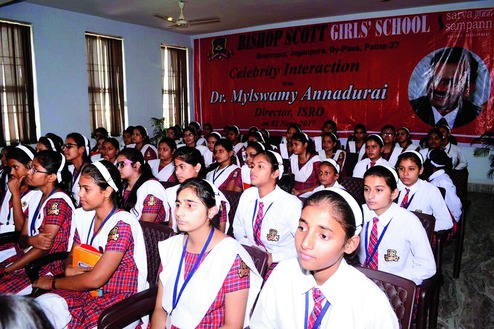
Patna: Now that we know about the existence of water on the Moon, can we live there? That was the question Snehal Sharma, a Class V student of Bishop Scott Girls School, asked Mylswamy Annadurai, director of the Indian Space Research Organisation (Isro), on Thursday.
It was one of the many questions the girls of the school bombarded the Isro director with during a special video-conference session that the school organised in collaboration with the Sri Jagannath Sita Education & Social Development Sansthan, a non-governmental organisation.
Annadurai, who has also served as the programme director of the Chandrayaan (India's Moon mission) and Mangalyaan (the country's mission to Mars), happily answered the students' questions.
"Water is one of the ingredients of life which is present in the Moon but then the safety aspect should also be looked into," he said in reply to Snehal's query. "In space, we get cosmic rays. The Earth is protected from these rays due to its atmosphere but in the Moon, there is no protective layer. We need to protect ourselves with special suits. Then we need food. Soil is required to grow food. We also require places to stay, which is, however, available in the form of caves. We need to study all these aspects holistically."
The girls, to their credit, asked pertinent and well-thought-out questions.
Class VIII student Ayushi Gupta asked why the National Remote Sensing Centre (NRSC) is unable to predict natural disasters such as floods, drought, and earthquakes. Class I student Sara asked how she could become a space scientist.
Among the other questions the students asked were: How and when will India become a major outsourcing destination for making and launching satellites?
Recently, another spacecraft of America's National Aeronautics and Space Administration (NASA), Cassini, has found out that Enceladus, the six-largest of Saturn's 53 moons which is a billion miles away from the Sun, has nearly all the ingredients needed to support life. So, can life exist on Enceladus?
"Recently, the country has increased its capacity of launching satellites," Annadurai said about the outsourcing destination question. "The country has launched 103 satellites, which shows a positive growth, but to be an outsourcing destination, Isro is working on first to become best in techniques."
He also said that there were possibilities of life's existence on Enceladus. "But we need to further study into this," he added.
Students also asked Mylswamy what attracted him the study of space, and what was most appealing about a lifetime dedicated to observing astral bodies. There were also a few questions related to Mission Chandrayaan-II.
Bishop Scott Girls School principal Lindsy Dayal Kumar and teacher co-ordinator Swati Jaiswal were present during the video-conference interaction.
"It was a memorable experience to see even students from Class I interacting with the Isro director and ask him questions during the programme," the principal said after the session.
"Today's programme was a great learning experience for everyone," she added.










